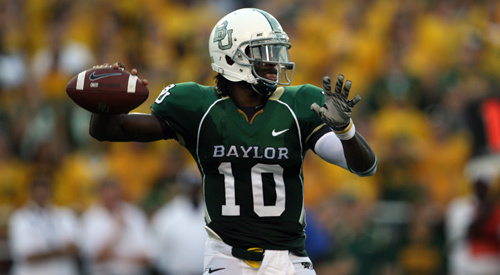
Robert Griffin III: Heisman can’t-idate
If you’re a college football fan, you know the name Robert Griffin III. He’s been called “The Most Exciting Player In College Football,” he’s been profiled in Sports Illustrated, he’s the first player in 35 years to be projected as both a potential NFL first-round pick and an Olympian, and he’s setting the NCAA on fire.
Griffin currently leads all FBS players with 22 touchdowns and a ludicrous completion percentage of 78.0 percent. He has a sky-high passer rating of 205.7 and 10.7 yards per attempt – both second only to Wisconsin’s Russell Wilson. He’s thrown for 1,950 yards, the ninth-highest total in FBS so far. He’s rushed 72 times for 295 yards and two touchdowns and he’s been one of the nation’s best overall players by just about any statistical measure you can think up. He carries himself well off the field too, and his accomplishments range from earning a political science degree in three years to working on a master’s to running track at the college level. Despite all that, though, he has next to no chance of winning the Heisman Trophy as college football’s top player.
What could harm an exciting candidate like Griffin? Is there some defining flaw in his game, something that makes the massive numbers he’s produced all but irrelevant? Well, yes, but it’s not intrinsic to Griffin, but rather the team he happens to play for.
Griffin plays for tiny Baylor University, a private Baptist school in Waco, Texas that’s more famous for a basketball scandal involving one teammate murdering another, president Kenneth Starr’s threats to file a lawsuit in a quixotic bid to stop Texas A&M from moving to the SEC, and its tennis teams (which have won 31 of the school’s 42 Big 12 conference titles since it joined the conference in 1996).
The school’s football team isn’t bad, but it’s no powerhouse and it’s not one to get a lot of media hype. Moreover, it’s not one that’s going to make a BCS push despite Griffin’s best efforts. The Bears are 4-2 on the season and were ranked 20th in an Associated Press poll heading into this past weekend before getting hammered 55-28 by Texas A&M. With that loss, they’ve probably given up their chance at national relevance and thus doomed Griffin’s Heisman candidacy.
[php snippet=1]
You see, the myth about the Heisman is that it’s given to the “top player in collegiate football,” a myth perpetuated by the trophy’s own apparent criteria. The Heisman asks voters to consider who is “the outstanding college football player whose performance best exhibits the pursuit of excellence with integrity,” but the reality is far different. For one thing, it’s a trophy that, by-and-large, only considers quarterbacks and running backs; no one outside those positions has won since Michigan defensive back/kick returner Charles Woodson in 1997, and you’d have to go back almost another 10 years to find the next non-QB, non-RB: Michigan wide receiver Desmond Howard in 1991, and then Notre Dame wide receiver Tim Brown in 1987.
Those particular criteria don’t doom Griffin, but the next set would: voters have repeatedly handed the Heisman not to the best player in all of college football, but to the best player who happens to play for a dominant team. Over the last three years, the winners have been Cam Newton (QB for national champion Auburn), Mark Ingram (RB for national champion Alabama) and Sam Bradford (QB for national runner-up Oklahoma).
The last Heisman winner not to be involved in the national championship game was 2007 winner Tim Tebow, whose Florida Gators had won the national championship the previous year, were ranked as high as No. 3 during the season, and finished the year ranked 13th. Beyond that, you have Troy Smith (QB for national runner-up Ohio State), Reggie Bush (RB for national runner-up USC), Matt Leinart (QB for national champion USC ) and Jason White (QB for Rose Bowl champion Oklahoma). The path to being considered a serious Heisman candidate is clear: play quarterback or running back for a national title contender, preferably one involved in the BCS championship game.
Could things ever change to a point where non-traditional candidates who don’t play an approved position or don’t play for a successful school receive more consideration? Well, it’s certainly possible, and baseball provides an instructive example here. MLB is often seen as tradition-bound, but Cy Young voters in 2010 selected Felix Hernandez as the top pitcher in the American League despite his 13-12 record and his Seattle Mariners’ 61-101 record, instead going off his dominant, more advanced stats such as ERA, WHIP and WAR. In effect, Hernandez wasn’t punished for having his dominant season for a team that couldn’t hit or field.
Maybe we’ll eventually see a similar shift in college football, where tremendous players like Griffin aren’t penalized for playing for lousy teams. After all, Griffin doesn’t play defense, so it seems rather unfair to penalize him because the Bears can’t stop anyone and aren’t going to contend for the national title. For the moment, though, if past Heisman voting patterns hold true, one of the most exciting and statistically dominant players in all of college football doesn’t have a prayer.
[php snippet=1]

